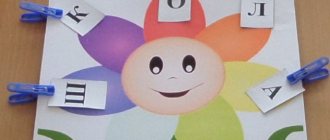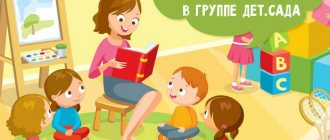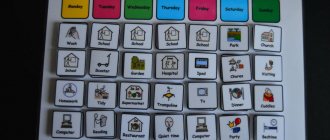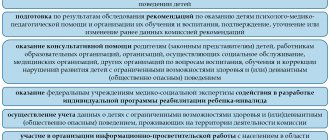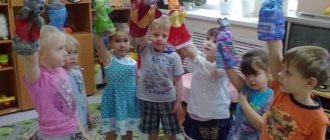Among the many preschool institutions, speech therapy kindergartens have their own characteristics. You can also find separate speech therapy groups in combined kindergartens.
If the preschool educational institution belongs to the correctional type, where children are brought up with speech problems as secondary disorders (for example, with mental retardation (mental development delay), visually impaired and hearing impaired), then a speech center is opened on the basis of the institution, which functions taking into account the main correctional program.
What is a speech therapy special group?
The speech therapy group is a specialized unit in a preschool institution designed to educate children with speech disorders. Children are assigned to it taking into account the specifics of not only speech characteristics, but also age.
Reasons why visiting a logogroup may be recommended:
- Delayed speech development in preschool children.
- Various types of disturbances in sound pronunciation (when the baby either does not pronounce it at all, or replaces one sound with another, pronounces it incorrectly, for example, the throat sound “r”).
- GSD (general speech underdevelopment).
They are assigned to a speech therapy group from the age of four, since children only from the age of 4 begin to understand and learn to hear how they speak.
Most often, in combined kindergartens there are two speech therapy groups - senior and preparatory. At the age of less than four years, classes with a specialist are recommended in case of delayed speech development. As a rule, children with mental retardation in general are lagging behind in development and can be sent to a specialized correctional kindergarten for preschoolers with mental retardation.
The best correctional kindergartens in Moscow 2021
Children's development center SEMA
The children's center in the Solntsevsky district takes care of the all-round development of children. The development center employs only highly qualified teachers who offer basic programs for the organic and proper development of the child, including activities necessary for the intellectual and aesthetic development of the child. The educational program includes a course of encyclopedic knowledge. In addition to the main program, parents, together with the teachers of the children's center, can create an individual development plan for their child. Elective classes include chess, modeling and fine arts, basic design skills, dance and physical development. Additional activities, selected in accordance with your child’s inclinations, will bring pleasure and joy to kids and parents.
Address: Moscow, st. Aviatorov, building 30 (entrance from the yard) ☎ Phone: 8-(499)-727-69-97; 8-(925)-843-70-60
Advantages:
- additional classes;
- individual development plan.
Flaws:
- not detected.
Kindergarten No. 1363 “Unity”
Municipal kindergarten No. 1363 “Unity” is located in the Southern Administrative District. Education is free for all children. Working hours of a general education preschool institution: from Monday to Friday from 7 to 19 hours, excluding public holidays. Classes with children are conducted by appropriately qualified educators, professional psychologists and speech therapists. For children who need the help of an orthopedic surgeon, individual lessons and therapeutic massages are provided.
All educators and teachers have extensive experience working with children and are highly qualified. The training sessions use both proven and new development programs for preschoolers. The “Origins” program, edited by M. A. Vasilyeva, V. V. Gerbova and T. S. Komarova, offers developmental programs covering four age periods: from birth to 7 years. Currently, the “Preschool Childhood” program based on A. Zaporozhets is proposed for use. Joint celebrations and competitions are prepared for all significant dates and holidays, open days and regular meetings with parents are held.
The working daily routine is traditional: three meals a day, training sessions in the first half of the day, an afternoon nap, walks twice a day: in the afternoon after classes and in the evening. A speech therapist and psychologist conduct individual sessions. Free time is devoted to games, drawing, music and dancing.
Address: Moscow, Severnoye Chertanovo microdistrict, building 812
Advantages:
- individual sessions with a speech therapist and psychologist;
- Extensive experience as educators and teachers.
Flaws:
- not detected.
Kindergarten No. 1794
Child Development Center No. 1794 is intended for children with speech disorders. Municipal institution. Free training and additional paid classes are provided on the basis of a general education institution. There are discounts and benefits.
All groups have a games room and a room with furnished sleeping areas. The nursery group is combined; children from 9 months to 3 years go to it. A professional psychologist works in a separate room. Individual tests are compiled and conducted for children, on the basis of which further work with students is carried out. For children whose parents are not at work all day, a half-day group is offered.
All children are examined daily by a health worker, and there is a separate first-aid post. Classes for children are based on the developmental program “Origins”, developed by a team of authors. Much attention is paid to the physical and aesthetic development of children, instilling a love for their native land and its history. The teaching staff of the institution has many years of experience and independently develops a series of classes in general educational and cognitive areas.
Children in kindergarten have an active lifestyle, physical education, and work on improving their speech. Parents can watch the progress of their children at matinees, prepared for holidays and themed events.
Address: Moscow, Balaklavsky Prospekt, building 3A
Advantages:
- great attention is paid to the physical and aesthetic development of children;
- a professional psychologist works.
Flaws:
- not detected.
Kindergarten No. 1703
The state uniform provides the availability of preferential seats, discounts on meals and some services. The work schedule of the preschool educational institution is traditional: from 7.00 to 19.00 five days a week. Days off for the kindergarten are all public holidays, Saturday and Sunday. There is a nursery group, but no swimming pool.
Professional educators, music directors, speech therapists and psychologists take part in teaching and conducting classes. According to a pre-drawn plan, compulsory classes are held for the entire group, and individual lessons are taught to develop speech, logic, and drawing.
Children of senior and middle groups learn to read and write, basic knowledge of mathematics, familiarity with the outside world, and etiquette. In classes in design, drawing, modeling, and music, children develop their creativity.
For the little ones there is a nursery group and a part-time group for children whose parents have part-time jobs. The territory of the kindergarten is surrounded by a fence and guarded.
Address: Moscow, st. Marshala Zakharova, house 11, building 2.
Advantages:
- there is a nursery group;
- individual sessions.
Flaws:
- not detected.
Private kindergarten "Drakosha"
The private kindergarten Drakosha in Novokosino is open to children from 1.5 to 7 years old. Experienced teachers will help adapt children of different ages to the environment. Here we offer an individual program for the adaptation of children with certain developmental features: speech delay against the background of a special mental state. Pupils are provided with a special development program: from physical exercises to school preparation. A system with specialized nutrition for children and certified products, street walks and quiet time. The daily routine for children was compiled taking into account children's interest and fun pastime.
Groups accommodate 12 children, thanks to which individual focus and adjustment of the condition of each child is realized individually.
The staff consists of certified specialists who have gained extensive experience in correction and rehabilitation.
Qualified doctors - speech therapists and experienced psychologists - work with the students. The uniqueness of the institution lies in taking into account the individual preferences of each of the children staying here.
Trained specialists will conduct a full diagnosis of the mental state, separately draw up a personal plan for carrying out the necessary measures, taking into account the versatility and different focus of the diagnosis, drawing up a separate plan for remedial developmental education.
Address: Moscow, st. Nikolay Starostin, 5
☎ Phone: 8 (495) 721 – 59 – 72
Advantages:
- individual focus and adjustment for each child;
- certified specialists;
- qualified doctors.
Flaws:
- not detected.
Combined kindergarten No. 288
The main specificity of the institution is the correction of speech and mental defects. When going through the difficult path of preparation before school, defectologists, speech therapists, psychologists and social workers will always help. teachers. In addition to correctional and inclusive groups, there are also general education groups for children aged 2, 5 – 7 years.
The program is selected according to various childhood pathologies: Down syndrome, genetic disorders, cerebral palsy, mental retardation, autism, vision, hearing and other defects. Each child has his own route. The psychological and pedagogical council develops the methodological part together with specialists in correctional pedagogy. The main task is to work with parents to involve them in the educational environment.
Address: Moscow, Kovrov lane, building 3 ☎ Phone: + 7 (495) 678 – 63 – 33
Advantages:
- working with parents;
- individual sessions.
Flaws:
- not detected.
Kindergarten No. 16 “Sun” of compensatory type
A specialized institution for children with speech disorders was opened about 60 years ago in the village of Chkalovsky, Shchelkovsky district, Moscow region. There are 4 groups open here: junior, middle, senior and preparatory for children from 3 to 6 years old.
In addition to traditional training and preschool tasks: training, sports activities, music, drawing, theater group, logarithmic exercises with fun games, teachers will work with children to help them speak and pronounce words correctly. To help parents, a “Correctional Mosaic” club was organized at the preschool institution, teaching relatives, mothers and fathers special exercises so that a child with disabilities develops correctly. It is based on the idea that speech development is inseparable from the coordination of control and body movement.
Studies have shown that children with speech disorders have underdeveloped movement skills and weak motor skills. Limitations often leave a big imprint on perception, attentiveness and memory. Clumsy motor skills are directly related to speech articulation, which is why classes with speech therapists are conducted in parallel with physical education.
Mentors and teachers, as well as relatives, try to master kinesiology (gymnastics for fingers, yoga, play scratching, massage and self-massage), which develop manual fine and foot motor skills. Particular attention is paid to breathing and relaxation exercises, which help to maintain self-control and have a positive effect on the brain cells that set the movement of other organs, taking into account speech function.
Address: Moscow region, Shchelkovo, Tsiolkovskogo street, 4a ☎ Phone: 8(496)259 – 70 – 17
Advantages:
- classes with speech therapists are carried out in conjunction with physical education;
- highly qualified specialists.
Flaws:
- not detected.
Preschool department No. 5 of school No. 2026
The kindergarten based at school No. 2026 (Pre-school No. 5) invites children with severe speech impairments and mental disorders to study in short-stay groups from 1.5 years old and full-day groups from 3 years old. Early integration into society and further adaptation with preparation for entry into kindergartens is carried out twice a week, three-hour classes without organized meals.
Children's groups for pupils with severe speech disorders:
The principle of classes is an early impact on speech activity in order to exclude secondary disorders of the speech organs, relying on ontogenesis, which carries out interconnected phonetic-phonemic and lexical-grammatical language components, a delimited and divided correct speech therapy approach to children suffering from OHP, with the existing structure of speech impairment.
The tasks of the correction center are the practical establishment and assimilation of language sciences - vocabulary and grammar, clear and correct pronunciation and speaking, complete preparation for mastering spelling, elements of writing, mastering the skills of coherent words and sentences.
The work of teaching preschool children with speech disabilities includes daily support and implementation of the goals set for teachers. Group and individual classes with speech therapists, teachers and music director are held smoothly and in a consistent manner.
Groups of children with mental development disorders:
The main and main task in school training of students with mental retardation is to raise the intellectual level and mental state: emotional and social. The level of school training is achieved with one set goal - the importance of helping and developing children with mental and developmental disorders to obtain the necessary knowledge, skills and abilities. It is not defined as an independent goal, but is considered one of the few means of developing positive mental health and development, identifying children's personal qualities and good upbringing.
Address: Moscow, Lukhmanovskaya street, building 13 A ☎ Phone: +
Advantages:
- frontal and individual lessons with speech therapists;
- coordinated work of specialists.
Flaws:
- not detected.
Preschool department with groups for children with complex disorders of correctional school No. 1708
The preschool educational institution accepts children with developmental disabilities. The premises for preschoolers occupies a 2-story brick building, located separately from the school. The child’s stay in the institution is 24 hours a day: parents bring the child on Monday at 8 am and pick them up on Friday at 21.
In addition to qualified educators, the children's institution has on its staff a speech therapist, a speech pathologist, additional education teachers and a Tomatis therapist.
The daily routine is intense, children are constantly supervised, group classes are held twice a day: in the morning and in the evening. In their free time, children engage in independent creativity, take part in role-playing games and artistic activities. Themed, tabletop and building materials are available for free play.
To register a child in the preschool department, a conclusion from the Moscow Center for Medical Education is required; upon admission of the child, the school medical commission conducts a mandatory examination.
Address: Moscow, Leninsky Prospekt, building 90A ☎ Telephone
Advantages:
- 24-hour stay;
- sensitive attitude towards sick children;
- special classes.
Flaws:
- not detected.
Are logogroups relevant?
Every year the percentage of children in need of speech therapy help is growing. This is due to many factors, which generally determines the relevance of kindergartens with speech therapy groups. In a mass preschool institution, where the occupancy rate is on average 20-25 children per group, it can be extremely difficult for a teacher to pay due attention to individual work with each student.
A regular kindergarten provides for working with preschoolers not only with intact intelligence, but also with normal speech. Therefore, often children with pronunciation problems, despite the fact that they are intellectually developed in the same way as their peers, often withdraw, cannot find contact with other people, and over time begin to lag behind.
If you do not take into account all the features in the development of a preschooler, the problem will not disappear; on the contrary, it will be much more difficult to cope with it at school. Thus, problems with pronunciation can lead to a violation of written speech - dysgraphia.
Speech therapy or regular preschool group: what are the differences?
There are differences between a regular mass group and a speech therapy group. Although, at first glance, it may seem that everything takes place in the same mode. The main difference lies in the specifics of the work itself:
- In the logogroup, the daily routine is structured differently, and educational classes are conducted differently, namely:
- Throughout the day, work is carried out not only by the teacher, but also by a speech therapist; classes are characterized by a correctional focus.
- The speech therapist and the group teacher keep an interaction notebook, thanks to which they can consolidate the material covered and quickly compensate for speech problems.
- Intensive individual work is carried out. Such classes are held for 10-15 minutes, depending on the mental cognitive characteristics of each of the pupils (attention, memory, thinking, perception). A speech therapist can take two or three children for a lesson, provided that they have the same speech impairments and are at the same level of development. Planning of such work is carried out in stages: from the formation of correct breathing to automation and differentiation of sounds.
- Classes of the teacher and speech therapist are conducted not only frontally, but also in subgroups. While the first subgroup studies with a teacher, the second with a speech therapist, after which the children change.
- The equipment of a speech therapy group also differs from that of a mass group:
- Here is a mirror for individual work. There is a pronunciation correction area, which is designed according to the age and speech characteristics of the children. Particular attention is paid to the development of phonemic hearing, therefore the developmental environment of the subgroup includes musical games, screens, etc. For pupils of groups with GSD (general speech underdevelopment), various sensory games are available, since speech is closely related to it.
- There is a speech therapy room or corner.
- Unlike the regular group, the speech special group has a smaller enrollment. According to all the rules, the number of students should not exceed ten, but there are exceptions. Due to limited space, occupancy may be higher in some cases.
- Long-term planning corresponds to the peculiarities of speech development of pupils.
Master class on speech therapy for teachers
The goal is to increase pedagogical personal experience. In the master class there is an active discussion between teachers on the problem of theory and gaming practice.
Master class objectives:
- Development of the ability to contribute to the formation of an individual style in teaching activities.
- To create a condition for the development of professional development of a teacher, during which experience is formed in speech exercises for the development of preschool children.
Master class for speech therapist teacher:
- Organizational moments (poems).
- Announcement of the topic of the master class.
- Theoretical part (theoretical aspect).
- Practical part (games).
- Reflection (questions).
Goals and objectives of speech therapy classes according to the Federal State Educational Standard
The speech therapist must take into account the psychological characteristics of the child. Sometimes preschoolers perceive speech therapy sessions as a game. Tasks of a speech therapist:
- Learning to pronounce all sounds.
- Development of coherent speech (construction of compound simple sentences).
- Understanding the differences between sounds.
- Formation and improvement of the impressive part of speech (understand what is being said).
Speech therapist teaches how to pronounce sounds
Individual lessons are a priority. It is considered very effective in overcoming speech problems. Thanks to this form, contacts and relationships are established between the speech therapist and the child, closed children open up. During classes, various techniques can be used: games, tasks.
Important. The frequency of classes is determined by a specialist, it all depends on the speech impairment and delay. Typically, classes last about half an hour and are held a couple of times a week.
Frontal speech therapy lesson in the preparatory group
When talking with a speech therapist, parents are allowed to attend classes to understand the technique chosen by the specialist.
Pros and cons of a logogroup
In speech therapy practice, specialists often encounter problems in working with parents who interfere with the correction process. Among parents there are those who are afraid to send their child to the logogroup, citing the fact that:
- The child may withdraw into himself, he will be uncomfortable and he may get stressed due to a change in the children's team and adults.
- Suddenly, in the special group there will be preschoolers with more serious speech impairments, and the baby will begin to speak even worse against their background.
In fact, there are no significant disadvantages or reasons for worry. Inconsistency with the age, mental and speech characteristics of children defined in one subgroup is an extremely rare phenomenon; this can only be encountered in case of non-compliance with the rules prescribed in state standards.
If the work is carried out conscientiously, in accordance with all requirements, then only advantages can be noted in visiting a speech therapy group:
- Logogroups have a small set, thanks to which each student receives more attention.
- The training program for preschoolers with speech impairments, but with intact intelligence, corresponds to the general education level, so when entering school, the child will not only speak well and correctly, but will also know the necessary educational material.
- Every day, not only the teacher, but also the speech therapist is involved in the development of children.
What should parents of three-year-old children be concerned about in their child's speech development?
- The child, understanding someone else’s speech, does not speak himself.
- The child speaks, but does not understand the content of someone else's speech.
- The child does not speak or understand words addressed to him.
- The child pronounces many sounds incorrectly.
Children's development centers and private clinics offer speech therapy services, but more often this means one-time individual sessions rather than an integrated approach. There is a significant difference between single sessions with a speech therapist and focused work in a speech group.
How to get into a special group?
How do children even get into a speech therapy group? In order for a child to be assigned to such a special group or kindergarten, the approval of the PMPK (psychological-medical-pedagogical commission) will be necessary. In turn, the child may initially be referred to the commission itself based on the results of an examination by a speech therapist of the speech status of children in a mass kindergarten. As a rule, pupils of the middle, senior and preparatory groups undergo such testing.
Depending on what specific problems are identified in the baby, additional sessions with a specialist will be recommended. In case of serious speech disorders, a referral is given to a primary medical education center and a visit to a combined kindergarten with speech therapy groups.
Recommendations for passing the commission can be obtained from employees of the kindergarten where the child originally went. In this case, educators, a psychologist and a speech therapist write a character reference for the pupil, which will be the basis for visiting a specialized institution or logogroup. The conclusion of a neuropsychiatrist speeds up this process if the problem really exists. For PMPC, it is necessary to collect other documents: a report from a psychiatrist, pediatrician, ENT specialist, ophthalmologist.
For whom are correctional institutions intended?
Such children's institutions are intended for preschoolers:
- With visual impairment. You can get into a specialized kindergarten after a doctor’s conclusion. Usually these are children who see poorly, have diseases and eye defects.
- who often get sick. This is the verdict given by the pediatrician. The doctor decides which institution the child will go to. This conclusion is made from the baby’s medical history over the past year.
- With the presence of partial or complete deafness. If a child does not hear anything from birth, he will definitely be sent to a correctional kindergarten and school.
- Diseases of the musculoskeletal function of the body. With such an illness, a referral to a specialized children's institution is prescribed by an orthopedist or neurologist. Here they work with children who have been diagnosed with a curvature of the neck, paralysis, or cerebral palsy. The work of educators is aimed at restoring the child’s motor function. Such babies require special attention and an individual approach.
Other directions
There are special preschool institutions with other specializations. Speech therapy direction is one of them. It was created to work with children who have a speech impediment. Referrals to such kindergartens are prescribed by a speech therapist.
Another category of special institutions includes organizations with an orthopedic profile. Children with bowed legs, chest deformities, and spinal scoliosis are accepted here. The orthopedist takes responsibility for sending preschoolers to such a kindergarten.
Specifics of work of correctional kindergartens
Such institutions accept children aged 3-7 years. Groups of no more than 8 children are recruited into the kindergartens. Every 3 children have their own teachers. This is done with the aim of providing reliable and professional care for the students.
An individual program of activities and development has been developed for each child. At the end of the working month, the results are summed up. Teachers make a report on the work done, in which they describe the successes of their students and development plans for the future. Everything that happens in class is recorded in special journals. This is done so that parents know everything about their children. Adults have the opportunity to work with children at home with the necessary focus (depending on the illness).
In classes with children they engage in modeling, reading, and music. From time to time, musicians and artists come here and stage small performances. The establishment can also visit a children's circus, where children can see clowns, animals, and a puppet show. Local administrations organize free visits to children's theaters, cinemas, zoos, and dolphinariums. Children have the opportunity to play in playgrounds and playgrounds. Teachers closely monitor the lunchtime naps and three meals a day for the students entrusted to them. After all, this is a necessary procedure for recovery.
